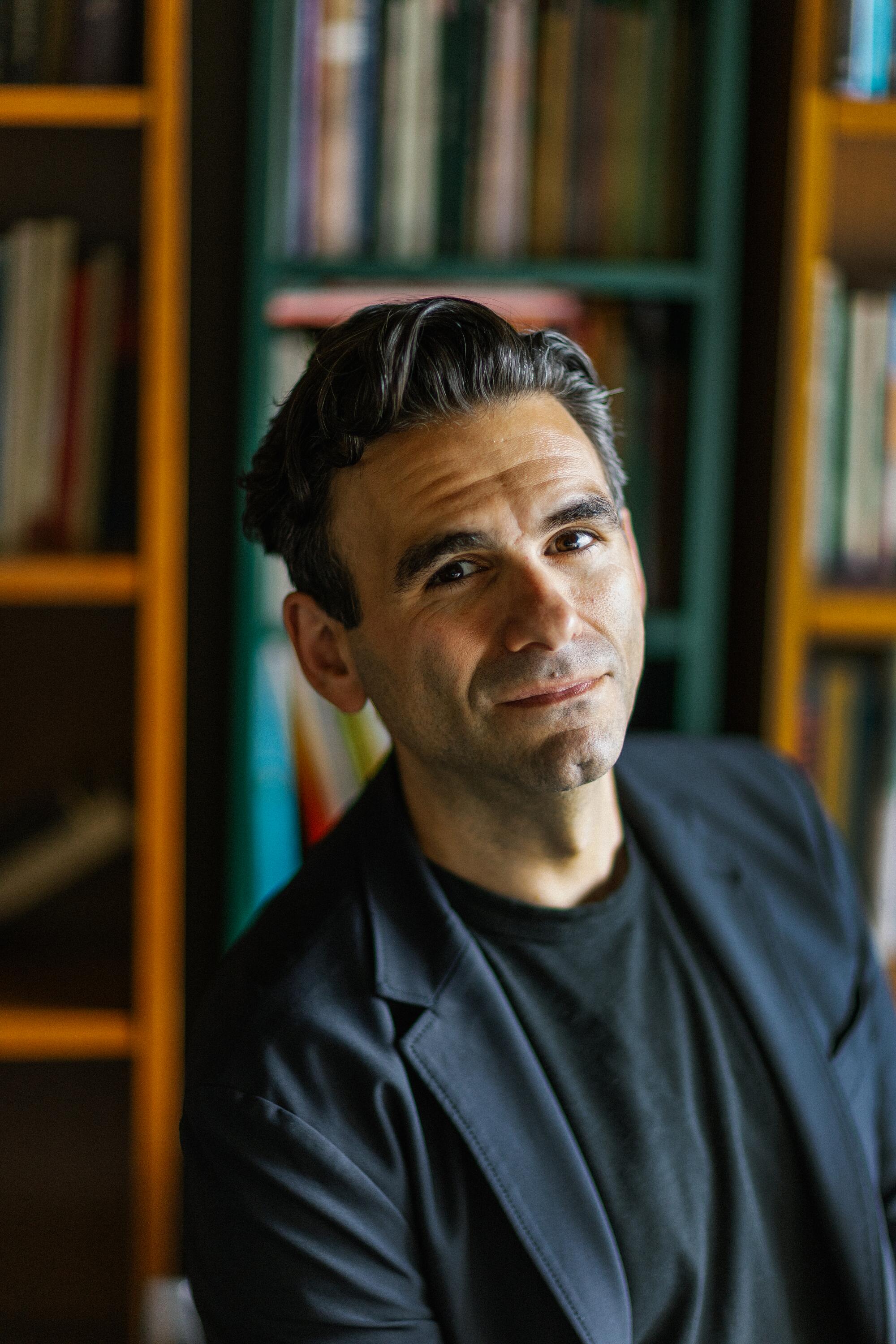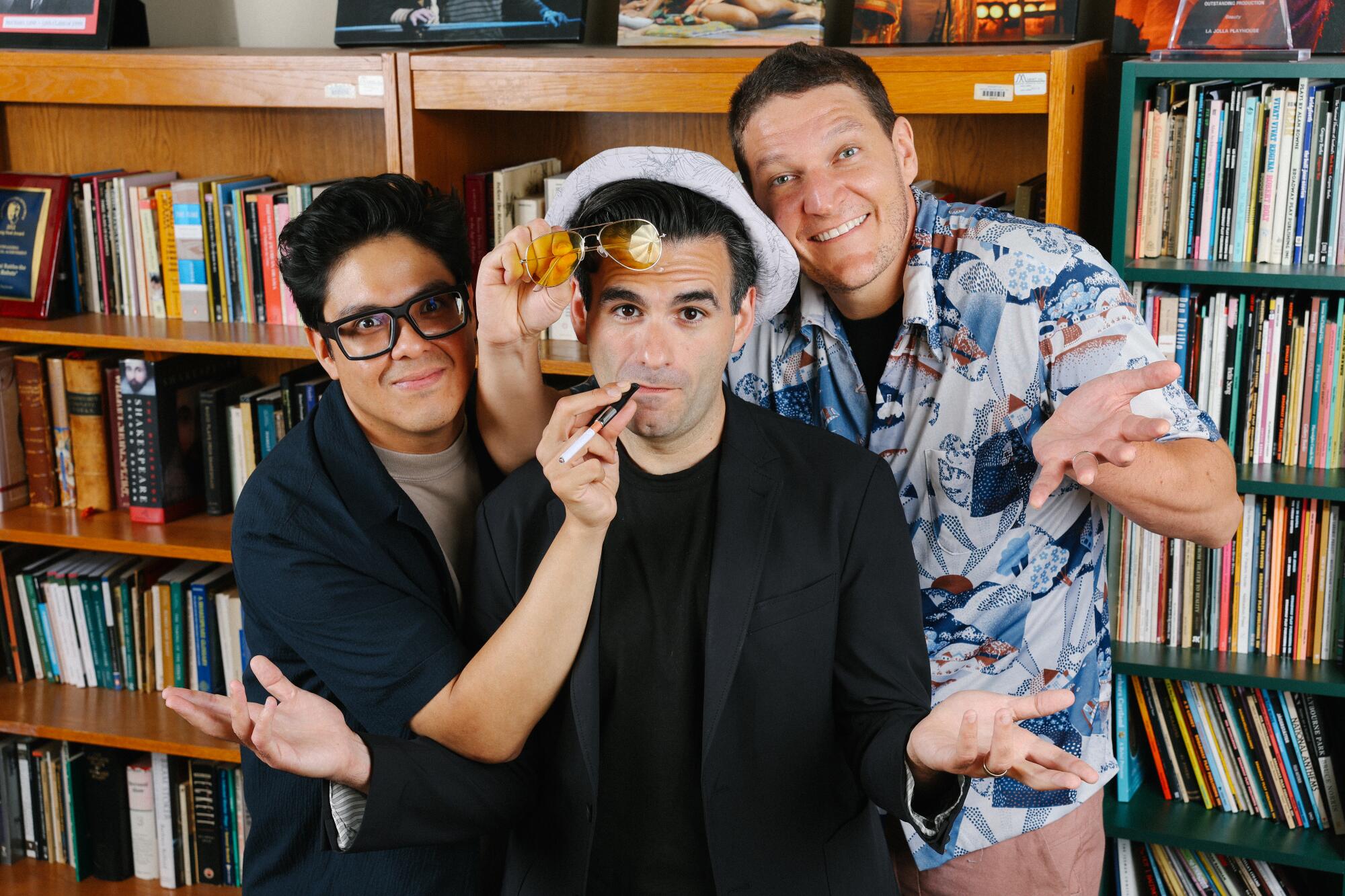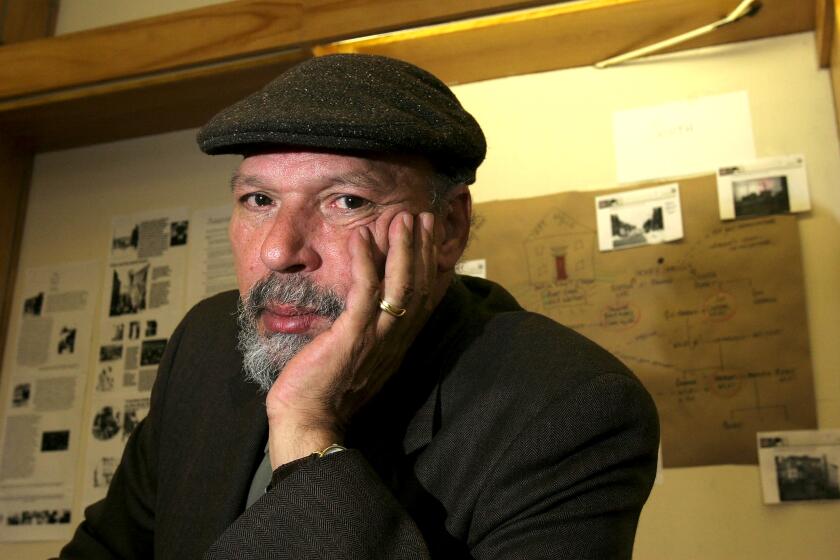
- Share via
This Tuesday, San Diego’s La Jolla Playhouse begins performances of “The Untitled, Unauthorized Hunter S. Thompson Musical.”
Yes, you read that right. The esteemed, eccentric, irreverent, intoxicated, gun-wielding godfather of gonzo journalism is the subject of an intriguing new stage show.
This world-premiere production, starring Tony-winning actor Gabriel Ebert as Thompson, is running through Oct. 8 — a week longer than initially scheduled, due to strong advance ticket sales. And its sights are aimed at Broadway.
Whatever confusion you’re feeling right now, Joe Iconis knows it well. “Yes, it’s actually a really terrible idea to try to write a musical about Hunter Thompson,” said the composer-lyricist, from whom the Playhouse commissioned the show 17 years ago.
“So many times throughout this process, I’ve definitely had moments where I’m like, ‘Am I out of my mind by having this person to be our leading character?’ Because it’s really scary to put someone like him at the center of a musical today.”
Direct from Broadway, ‘Peter Pan Goes Wrong’ from the British company Mischief, turns J.M. Barrie’s tale into a farcical fiasco.
But Iconis — known for boosting the wild and weird through his popular Family concerts and the musical “Be More Chill” — has a relatively rebellious plan for showcasing this unconventional subject in what he considers an all-too-formulaic framework.
“Musicals that are authorized ‘biographies’ tend to center people who feel untouchable because any ugliness or flaws in their character are usually super smoothed out, or they make a little appearance and then, after a ‘come to Jesus’ moment in the middle of Act 2, they’re redeemed by the end of the show,” he explained, not naming any bio-musical in particular.

“The point of this is not to simply tell [Thompson’s] life story and celebrate what a great man he was,” he continued.
“His art, his ideas and his contributions to the world are worthy enough of a true examination, but so many of his actions were questionable in their own time, and especially when filtered through the lens of 2023. So I don’t want to sugarcoat anything or soften him up. I want to put this complex, challenging man at the center of this story, and not make any bones about the fact that he is complex and challenging.”
Of course, this disruptive approach to the bio-musical, now a staple of the American musical theater landscape, echoes Thompson’s iconoclastic attitudes toward journalistic conventions. By injecting himself into his reportage and prioritizing his subjective view over a universal objectivity, he captured the social and political turbulence of the 1960s and 1970s in an unprecedented way.
“[His] 1972 campaign dispatches for Rolling Stone conveyed the energy, the isolation, the mood swings, the tension and the emotional wear of politics in a fashion that made him the most distinctive and entertaining writer in the country,” wrote Times staff writer John Balzar in 2001. “His humor, hyperbole, hope, insight, ego, angst, aggression and action — all pumped up to manic excess — defined an elastic style of reportage called Gonzo. No one has successfully imitated it. It was — is? — the style of one man alone.”
But Thompson became as known for writing about the counterculture as he was for embodying it himself — on the page and in the flesh. “He created a hard-drinking, drug-ingesting persona for himself; … he made being way out of control his topic,” wrote Times film critic Kenneth Turan in 2008. “In the end, he became as much a prisoner of that façade as any square trapped in a nine-to-five job.”

The musical, which spans Thompson’s childhood in Kentucky to his death in Colorado, tracks the creation of his mythologized image through his best-known works — “Hell’s Angels,” “The Kentucky Derby Is Decadent and Depraved,” “Fear and Loathing in Las Vegas,” “Fear and Loathing: On the Campaign Trail ’72” — and how his fame impacted the characters of his life: his first wife, Sandra Conklin; his Rolling Stone editor, Jann Wenner; his nemesis, President Richard Nixon; and his close friends, illustrator Ralph Steadman and civil rights activist Oscar “Zeta” Acosta.
“Some of the material is upsetting because Hunter burned a lot of bridges,” said Ebert, referring to Steadman and Acosta. “He did some pretty despicable stuff to both of these men who believed they had a real friendship and helped him get to the places he had gotten to. Joe is adeptly telling a story of how the power of writing and art can change the world, but also how hubris and arrogance can really destroy relationships. The show honors these key figures, even as Hunter dishonors them.”
Take the musical’s notable treatment of Acosta, whom Thompson famously maligned by obscuring his background in the 1971 novel “Fear and Loathing in Las Vegas.”

“There would be no gonzo without Oscar,” said George Salazar, Iconis’ frequent collaborator, who portrays Acosta. “He’s a real badass with an incredible mind, and he was proud of who he was. But the way he’s depicted, Oscar was often a caricature.”
Onstage, the Chicano attorney roars in with a rollicking introductory number that outlines his achievements, attitudes and Thompson-like affinities for drugs, booze and radical politics. “I want that song to feel like an event, like the show was just stolen away from Hunter by Oscar,” explained Iconis. “And when Oscar disappears, I hope his absence feels cruel to the audience.”
A bio-musical sanctioned by Thompson’s estate may not have the freedom to portray these parts of his past so bluntly. (Iconis, who also co-wrote the show’s book with Gregory S. Moss, says he approached the late author’s estate in 2016 anyway, more to respectfully notify it of the show’s existence. “The estate was very much like, ‘It feels like it will be impossible for you to ever afford the actual rights to any of these things so, as long as you’re not quoting anything directly, make your piece of art,” he recalled. “All things considered, they were super cool about the whole thing.”)
August Wilson, the late Pulitzer Prize-winning playwright who chronicled the Black experience in America, gets a stirring biography from Patti Hartigan.
Still, the show infuses Thompson’s signature characteristics into its numerous storytelling elements. Linked together as if all part of one continuous stream of consciousness, the songs lyrically outline the writer’s cultural observations, political optimism and admiration for F. Scott Fitzgerald; their compositions, played by an all-analog band positioned onstage, echo his rhythmic sentences and peculiar speech patterns. During these numbers, characters regularly break the fourth wall to address the audience.
“The show is so aware of the fact that we’re all in a room together; it calls attention to itself in the way that Hunter put himself at the center of his writing,” said Iconis. “He addressed the reader directly, he talked about himself. And so it just makes sense that a piece about him would do the same thing.” (Because of Thompson’s mumbling habit, Iconis briefly considered a delivery akin to spoken word, “but you know what? It’s a musical. Hunter is our leading man. He’s gonna sing for real.”)

To chart Thompson’s penchant for psychedelia, Ebert — donning the iconic bucket hat, aviator sunglasses and cigarette holder — is experimenting with “bolder physicality that’s more luxurious and bendy” when Thompson is younger, and then depicting the corporal effects of his legendary drug and alcohol use as he aged. (Also sprinkled throughout Ebert’s performance: homages to Bill Murray’s Hunter from the 1980 film “Where the Buffalo Roam” and Johnny Depp’s Hunter in the 1998 film “Fear and Loathing in Las Vegas.”)
And the subject’s aggressively spontaneous spirit is represented by the pace of events, revisited by Thompson from his Colorado cabin. The 10-actor cast rarely leaves the stage; they each quickly pivot among several roles and settings by grabbing costume pieces from the walls, pulling props from the couches or animating puppets without warning.
“There’s a real anarchic theatricality,” said director Christopher Ashley. “Nothing’s ever quietly naturalistic, it’s always had a bit of dementia or a hallucinatory feeling that anything can happen at any time.”
“We wanted this to feel handmade, scrappy, alive and strange,” added Iconis. “So many musicals I see feel very corporate and clean and created by committee. I don’t create by committee, and Hunter didn’t either. So I hope that the people who know him well can come to the show, look at the way this story is told and be like, ‘Yeah, that right there is a gonzo musical.’”
'The Untitled, Unauthorized Hunter S. Thompson Musical'
Where: La Jolla Playhouse, 2910 La Jolla Village Drive, La Jolla
When: 7:30 p.m. Tuesdays-Wednesdays, 8 p.m. Thursdays-Fridays, 2 and 8 p.m. Saturdays, 2 and 7 p.m. Sundays. Ends Oct. 8.
Tickets: Start at $25
Info: LaJollaPlayhouse.org, (858) 550-1010
Running time: TBA
More to Read
The biggest entertainment stories
Get our big stories about Hollywood, film, television, music, arts, culture and more right in your inbox as soon as they publish.
You may occasionally receive promotional content from the Los Angeles Times.














